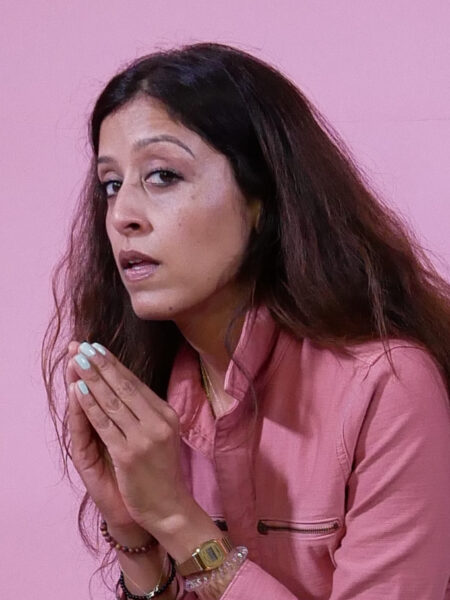
Amrita Dhaliwal
As part of a Q&A series with our faculty, the USC School of Dramatic Arts asked faculty member Amrita Dhaliwal about balancing humor with seriousness, using comedy as a tool for social change and being the keynote speaker at this year’s USC APIFSA meeting.
Tell us a little about your professional career.
Amrita Dhaliwal: I’m a Punjabi American devising artist and award-winning clown, arts leader and educator based in Los Angeles. My work spans multiple mediums, from stage to TV & Film. In my work, I explore core themes of humanity, like death and love, through a lens of the current social-political climate.
What is the most rewarding part of teaching?
“The Arrival.” There is a moment when the students artistically and creatively arrive into their play. It’s a different timing for each student, but there is a collective moment when the entire group becomes one, like an ensemble, and the level of play is elevated. This is such an important moment because two things happen: 1.) the students realize that their growth is linked to each other, and 2.) that play can be created, grown and fostered through collaboration and listening. Ultimately, we need each other.
What is your favorite advice to give to students?
There are two that I toggle between: 1.) We happen to live in a civilization in which there are the artists and the ones who watch the artists. This is just a construct. A bird sings, we play. This is our human nature. We just happen to be in a time when the artist is separated into a performer and the audience. And because of the counterpoint of the audience, it forces the performer into a perversion as well. So go gently – know you are an artist as we are all artists, it is our human nature – and trust your inner guidance versus the machine of marketing around you. 2.) Don’t worry about if you believe you’re good enough or not – just practice practice practice / play play play / go go go.
What led you to explore comedy as a tool for social change?
Comedy can be a gentle and kind disrupter of entrenched beliefs. As a kid I noticed it could disarm arguments and bullies. And our current culture, in which we are also experiencing a massive narrative collapse (i.e. headline culture) and a limited attention span, comedy becomes a powerful tool when we don’t have time or the intellectual endurance to change long-held beliefs. However, comedy can also be extremely counter-productive to social change. If all we do is laugh at our hypocrisy, our harmful systems, our dangerous leaders, then we trivialize the real danger of systems and their impact. It all becomes entertainment, like a soap opera. So by no means is comedy the tool for social change, but it is one tool that, when used well, can be very effective.
How do you balance serious themes and a comic lens in your work?
I sometimes wonder how people stick to the one lane! For me, I don’t know how I do it, but I just do. I want to make the room cry and laugh and then cry again and then laugh again and so on. I think I owe this to my Punjabi heritage, which is constantly asking me to hold a multitude of realities (and it’s a tad bit melodramatic) as well as to my late mentor Paola Coletto, who stressed the truth of nature, which is dark and light. So, my work is full of the both/and.
You’ve been selected as Keynote Speaker at this semester’s USC Asian Pacific Islander Faculty Staff Association event. What does it mean to you to have the chance to speak at this event?
I was so surprised when they asked me. I was deeply honored and humbled. There is a heartwarming, homecoming feeling when you gather in solidarity and celebration.
Is there a piece of theatre, or a film or television show that has recently resonated with you?
Every artist should watch both of these: 1.) a documentary about the life and legacy of Moholy-Nagy called The New Bauhaus, and 2.) a documentary about the life and legacy of Chavela Vargas, called Chavela.
Any fun facts we should know about Amrita Dhaliwal?
I’m an identical twin. So if I don’t say hi, don’t take it personally—it might be my twin. Or that I don’t like you… but you’ll never know.